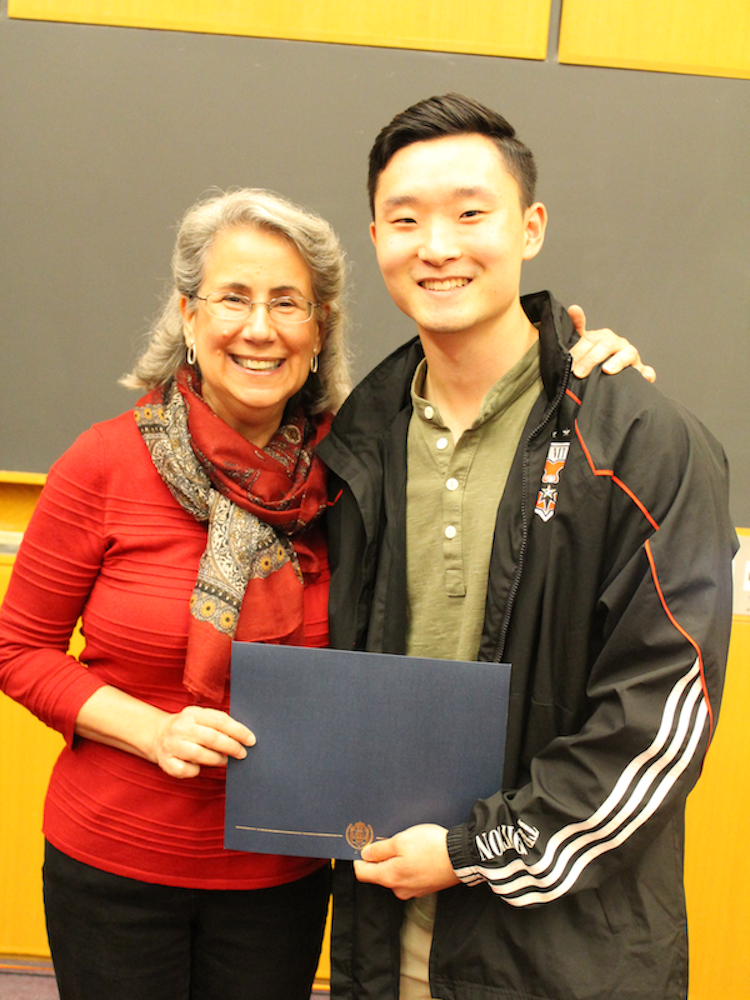Student Profiles: Joseph Han ’17
When Joseph Han ‘17 arrived at MIT as a freshman, he had a good idea what he wanted to do with his life. “I knew my end goal was to be a military doctor,” he says. “I wanted to blend service with my passion for medicine.” But it was through his discovery of an equally powerful passion for foreign languages that Han was able to map a precise path to his medical service career.
The recipient of a 2017 Distinguished Scholar Award from Global Studies and Languages (GSL), Han majored in biological engineering while engaged in the U.S. Air Force ROTC at MIT. The academic demands of freshman year and officer training left little time for anything else in his life. “We had to keep to a regimented schedule, going to sleep early in order to get up at 6 am for physical training sessions, and military instruction classes,” he recalls. “It was a serious commitment, but I was keen on joining the Air Force and getting into medical school.”
The child of a Korean-born father and a mother of Chinese descent, both public servants, Han had grown up in a northern Virginia home conversing in English and Korean. His parents had enrolled him in Spanish immersion classes in elementary school. “I started off in an intercultural household,” Han says. Yet in spite of his linguistic head start, Han arrived at MIT “not contemplating an emphasis on language,” he says.
But an ROTC-sponsored summer abroad program in Korea following freshman year dramatically shifted his perspective. “This program greatly improved my speaking and writing skills, along with my appreciation and understanding of Korean culture,” he says. “The world opened up for me.”
Han was determined to continue to advance his Korean studies, for personal and professional reasons. “I wanted to come closer to my cultural heritage,” he says, “and Korean is considered a critical language by the US military and government.”
Once he cleared his schedule of required courses in junior year, Han took his first GSL class, in Korean. “I found the idea of being able to communicate with people in their native tongue, to speak like a countryman, really satisfying and rewarding.”
But gaining fluency in Korean was just the start for Han. “When I was young, I developed a soft spot for Spanish, so I decided to become fluent in that language as well,” he says. “It was important to me to be able to communicate with any Spanish or Korean speaker on any topic, establishing a bond that one could not make in any other way with someone from another country.”
Han also came to believe that foreign language fluency was transformative: “Once you’re immersed in a culture at a deeper level, it has the potential to shape how you interact with everyone, every day,” he says. “Your mannerisms change, and to some extent your way of thinking.”
When entering his senior year, Han realized he had enough credits to graduate early, but “chose to stick around another semester to continue Spanish classes, and to add another language— Mandarin Chinese.”
Han ended up taking three courses in Spanish, including one over IAP, which involved a trip to Madrid. “Through my home stay, I was able to live and breathe Spanish culture,” he says. “My amazing instructor, Margarita Ribas Groeger, was there with us, and so incredibly helpful, whether with an essay, grammar, or anything in general.”
Groeger describes Han as a standout student who rapidly acquired proficiency, “a testimony of his dedication and hard work,” and of “the profound significance that being able to communicate in different languages has for him.”
According to Groeger, Han does not just get personal satisfaction from learning different languages and communicating with others. His “passion for mastering multiple languages is driven by the goal of better serving his patients when he becomes a doctor,” she says.
Han, who performed research on inflammatory bowel disease at the Koch Institute for Integrative Cancer Research, and served on MIT’s emergency medical team, will soon be able to put his Spanish language skills to use. He will be studying at the Icahn School of Medicine at Mt. Sinai in New York, which has a student outreach program in the east Harlem community, where the population is 50% Hispanic. “They need Spanish-speaking medical students to run clinics, and I look forward to participating in the program.”
Before medical school, he is taking time to become more fluent in both Spanish and Korean. First he is headed to Xalapa, Mexico to work for a social enterprise startup accelerator, working with students interested in biology and the biomedical fields. “I told my coordinator that I wanted to do anything that will force me to speak Spanish on a daily basis.” Then he is off again to Korea, where he will also work with a startup.
His greatest satisfaction at MIT has been the opportunity “to take as many languages classes as I have,” says Han. It provides the perfect platform for his dream, which is “to serve in the Air Force as a doctor, traveling around the world, utilizing all the language skills I’ve developed.”

